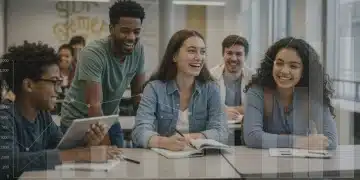Life learning disability support: Empowering individuals

Life learning disability support includes self-advocacy, community resources, and effective strategies to empower individuals, enhance their educational experience, and foster inclusive environments.
Life learning disability support plays a crucial role in empowering those facing learning challenges. Whether you’re personally affected or know someone who is, understanding how to navigate these supports can make all the difference. Let’s explore the various aspects that foster growth and development.
Understanding learning disabilities
Understanding learning disabilities is crucial for supporting individuals who face educational challenges. These disabilities affect how people process information, making traditional learning methods ineffective. It’s important to recognize that learning disabilities are not indicative of intellect; rather, they are specific difficulties that vary from person to person.
Types of Learning Disabilities
There are several types of learning disabilities, each impacting learning in unique ways. Here are a few common types:
- dyslexia: Affects reading and decoding words.
- Dysgraphia: Impacts writing and motor skills.
- Dyscalculia: Challenges with math concepts and calculations.
Recognizing these challenges can help create better learning strategies tailored to individual needs. Understanding each type allows students, teachers, and families to address specific difficulties effectively.
Signs of Learning Disabilities
Identifying signs early can lead to timely support. Some signs include:
- Difficulty following directions.
- Struggles with reading or writing.
- Problems with organization and time management.
When these signs are spotted, it’s crucial to seek assessments from professionals. The earlier a learning disability is identified, the sooner effective support can begin.
In schools, understanding the diverse needs of students with learning disabilities can alter how educators approach teaching. Learning disabilities do not define a person’s ability to learn; they simply highlight a different path the individual may need.
Importance of support systems
The importance of support systems cannot be overstated when it comes to individuals with learning disabilities. These systems provide essential resources and encouragement, helping people navigate challenges more effectively. Having a robust support network can significantly improve the educational experience and overall well-being of those affected.
Types of Support Systems
Support systems can come in various forms, each playing a unique role in the development of individuals with learning disabilities. Some of these include:
- Family Support: Encouragement and understanding from family members.
- Teacher Support: Educators trained to recognize and address specific learning needs.
- Peer Support: Friends and classmates who foster a sense of belonging.
Each type of support adds a layer of strength to the individual’s journey, making challenges more manageable. When these elements work together, they create a more inclusive environment for learning.
Benefits of a Strong Support System
A strong support system yields numerous benefits. For instance, individuals often experience:
- Enhanced self-esteem and confidence.
- Improved academic performance.
- Better social interactions and relationships.
These benefits stem from the reassurance that they are not alone in their struggles. Knowing that support is available can motivate individuals to pursue their goals.
Additionally, support systems often facilitate access to tailored resources. This can include specialized tutoring, therapy, and workshops designed for specific learning needs. As a result, individuals can develop better coping strategies and skills to manage their learning disabilities effectively.
Effective strategies for learning assistance

Implementing effective strategies for learning assistance is vital for helping individuals with learning disabilities succeed. These strategies can help individuals engage better in their education, ensuring they receive the support they need. Each person is different, so tailoring strategies to meet specific needs is essential.
Individualized Learning Plans
One approach is to create individualized learning plans (ILPs). These plans focus on the unique strengths and weaknesses of each student. They are designed to:
- Set clear goals for academic achievement.
- Identify necessary resources and accommodations.
- Incorporate feedback from teachers and parents.
Using ILPs helps create a structured path for students, allowing them to navigate their learning experiences more effectively.
Utilizing Technology
Another effective strategy is to incorporate technology into learning. Various tools can assist students with learning disabilities. For example:
- Text-to-speech software: Helps with reading comprehension.
- Interactive apps: Encourages engagement with learning materials.
- Online resources: Provides additional support and practice.
Technology can make learning more accessible and enjoyable, empowering students to take control of their education. It often offers alternative methods of displaying information which can aid understanding.
In addition to technology, using multi-sensory approaches can greatly benefit students. Engaging multiple senses during lessons can enhance retention and comprehension. For instance, using visual aids, hands-on activities, and auditory components can create a richer learning environment.
Regular assessments and adjustments to the strategies are also crucial. This way, educators can monitor progress and make necessary changes, ensuring that individuals are supported throughout their learning journey. By continuously evaluating the effectiveness of the strategies employed, the support system can effectively adapt to meet ongoing needs.
Community resources for individuals with learning disabilities
Accessing community resources for individuals with learning disabilities can significantly enhance the support available to those in need. These resources provide additional tools, services, and networks that facilitate learning, growth, and development. Understanding where to find these resources empowers families and individuals to seek effective assistance.
Types of Community Resources
Communities often offer a variety of resources. Some crucial types include:
- Nonprofit organizations: Many nonprofits specialize in learning disabilities, providing workshops, tutoring, and advocacy.
- Support groups: These groups allow individuals and families to connect, share experiences, and find emotional support.
- Local educational services: Schools may have resources for special education that families should explore.
Each of these resources plays an important role in creating a supportive environment for individuals with learning disabilities.
Utilizing Local Libraries
Public libraries can be a treasure trove of resources. Many libraries offer:
- Books on learning disabilities.
- Programs and workshops designed to assist those with learning difficulties.
- Access to technology and computer classes.
By utilizing local libraries, individuals can find essential information and tools to aid their learning journey.
In addition to these resources, many communities have partnerships with local businesses to provide internships and job training for individuals with learning disabilities. These opportunities help build skills and confidence, which are vital for future success. Community involvement fosters an inclusive atmosphere, encouraging everyone to contribute and thrive.
Engaging with these community resources not only benefits individuals with learning disabilities but also helps raise awareness and understanding within the broader community. Through collaboration and support, we can create a more inclusive world where everyone has the opportunity to succeed.
Empowering self-advocacy in learning disabilities
Empowering self-advocacy in learning disabilities is crucial for helping individuals take control of their own educational journey. When people learn to advocate for themselves, they become more engaged in their learning process. Self-advocacy enables individuals to express their needs and rights effectively, which can lead to better support and outcomes.
Understanding Self-Advocacy
Self-advocacy means speaking up for oneself and understanding one’s rights. This concept is vital for individuals with learning disabilities, as it helps them navigate educational settings confidently. Important aspects of self-advocacy include:
- Knowing one’s strengths and weaknesses.
- Understanding the accommodations available.
- Communicating needs to teachers and peers.
Through self-advocacy, individuals are empowered to take an active role in their education and future. This can lead to better engagement in their learning and foster deeper connections with educators and support staff.
Strategies for Empowerment
There are various strategies that can help cultivate self-advocacy skills. Some effective methods include:
- Participating in self-advocacy workshops.
- Engaging in role-playing scenarios to practice communication.
- Encouraging open discussions about needs with teachers and family.
These strategies provide individuals with the tools they need to navigate challenges. Encouraging self-advocacy not only boosts confidence but also allows individuals to identify their goals and create a clear path to achieve them. This can involve planning steps to reach educational milestones or career aspirations.
Additionally, connecting with peer support groups can further enhance self-advocacy skills. Sharing experiences and learning from others fosters a sense of community and understanding. Together, individuals with learning disabilities can build a strong network of support, encouraging each other to voice their needs and seek the help they deserve.
In summary, supporting individuals with learning disabilities is essential for fostering their growth and development. By focusing on self-advocacy, utilizing community resources, and implementing effective strategies, we can create an inclusive environment that empowers everyone. Together, we can help individuals recognize their strengths, navigate challenges, and achieve their goals. This collective effort not only enhances individual lives but also builds a supportive community that values diversity and inclusion.
FAQ – Frequently Asked Questions about Learning Disabilities
What is self-advocacy and why is it important?
Self-advocacy is the ability to speak up for oneself and express individual needs. It is important because it empowers individuals with learning disabilities to take control of their education and seek the support they need.
What types of community resources are available for individuals with learning disabilities?
Community resources include nonprofit organizations, support groups, local educational services, and public libraries that offer tools and support tailored to learning disabilities.
How can technology assist individuals with learning disabilities?
Technology can assist through software tools, interactive apps, and online resources that enhance learning experiences and provide tailored support for individual needs.
Why is it beneficial to join peer support groups?
Joining peer support groups allows individuals to share experiences, build a sense of community, and gain insights from others facing similar challenges, fostering a supportive environment.





